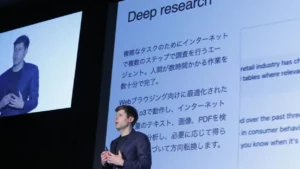In a landmark move set to redefine the landscape of online research and analysis, OpenAI, a leader in artificial intelligence innovation, has launched Deep Research, a cutting-edge AI tool designed to function as a sophisticated research analyst. This groundbreaking agent promises to drastically reduce the time and effort required for in-depth investigations, offering comprehensive reports in mere minutes that could previously take human analysts hours or even days to compile.
What is Deep Research?
Deep Research is not just another chatbot; it’s a powerful, independent agent capable of conducting multi-step, thorough, and precise research across the internet. Powered by a specialized version of OpenAI’s advanced o3 model, optimized for data analysis and web Browse, Deep Research can autonomously find, analyze, and synthesize information from hundreds of online resources, including text, images, and PDFs. This allows it to generate detailed, structured reports complete with citations, mimicking and potentially surpassing the output of a human research analyst.
OpenAI emphasizes that Deep Research leverages advanced reasoning capabilities, enabling it to not only gather information but also to interpret content, identify patterns, and draw insightful conclusions. Trained using end-to-end reinforcement learning, the tool can dynamically adjust its research trajectory based on the information it uncovers, backtracking and pivoting in real-time to ensure comprehensive and accurate results. The final output is presented as a well-organized report directly within the ChatGPT interface, with future updates planned to include embedded images and data visualizations.

Key Features and Benefits for Professionals and Consumers
Deep Research is poised to become an indispensable tool for professionals across various knowledge-intensive sectors, including science, engineering, finance, and policy. Imagine researchers rapidly conducting literature reviews, financial analysts quickly assessing market trends, or engineers efficiently gathering technical documentation. The benefits are immense:
- Unprecedented Speed and Efficiency: Tasks that traditionally take hours can be completed in tens of minutes, significantly boosting productivity and freeing up valuable time for other complex tasks.
- Comprehensive and In-depth Reports: Deep Research synthesizes information from vast online resources to create detailed reports, providing a holistic understanding of complex topics.
- Enhanced Accuracy and Reliability: By citing sources for every claim, Deep Research promotes transparency and allows users to verify information, mitigating the risks associated with AI “hallucinations.”
- Adaptability and Flexibility: The tool can handle diverse inputs, including attached files and spreadsheets, allowing for tailored responses and contextualized research.
- Expert-Level Reasoning: Early evaluations show Deep Research achieving impressive scores on benchmarks designed to test expert-level reasoning, surpassing previous AI models significantly.

Beyond professional applications, Deep Research also caters to discerning consumers seeking hyper-personalized recommendations for complex purchases like cars, appliances, and furniture. Imagine effortlessly comparing models, features, and reviews to make informed decisions, all powered by AI-driven in-depth research.
Impact and Future Implications for AI and Research
The launch of Deep Research marks a significant step towards OpenAI’s broader vision of developing Artificial General Intelligence (AGI). By enhancing AI’s ability to conduct sophisticated research and analysis, OpenAI is pushing the boundaries of what machines can achieve in terms of knowledge work and problem-solving.
This innovation arrives amidst an intensifying race among tech giants to develop AI-powered research solutions. Competitors like Google and DeepSeek are also actively innovating in this space, highlighting the growing market and demand for AI-driven research tools. While Deep Research offers remarkable capabilities, experts emphasize the importance of human oversight and critical thinking. AI should be viewed as a powerful tool to augment human expertise, not replace it entirely. As AI research tools evolve, ongoing refinement and responsible development will be crucial to ensure accuracy, reliability, and ethical application.
Availability and Access
Currently, Deep Research is available to ChatGPT Pro subscribers at a price of $200 per month, with a limit of 100 queries. OpenAI plans to expand access to Plus, Team, and Enterprise tiers in the near future, along with enhanced rate limits as the technology evolves. Deep Research is currently accessible via the ChatGPT web interface, with rollout to mobile and desktop platforms expected within the coming month.
Conclusion: Revolutionizing Knowledge Work with AI
OpenAI’s Deep Research is more than just a new tool; it’s a paradigm shift in how we approach research and analysis. By automating complex, time-consuming tasks and delivering comprehensive, insightful reports, Deep Research empowers professionals and consumers alike to unlock new levels of productivity and knowledge. As AI continues to advance, tools like Deep Research will play an increasingly vital role in shaping the future of work and accelerating innovation across industries. The era of AI-assisted research is here, and OpenAI is leading the charge.





